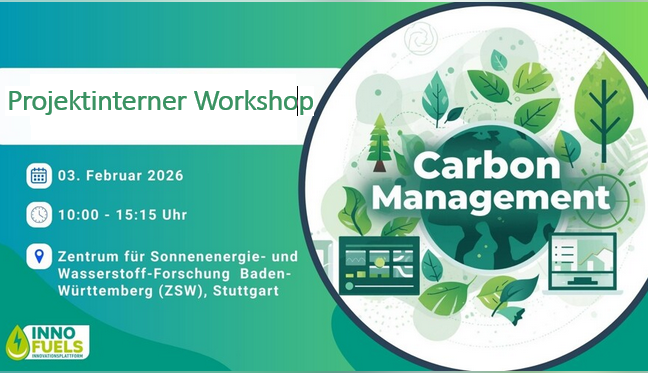
The focus is on current (inter)national developments in carbon management as well as industrial perspectives on CO₂ demand, quality, and recycling, and approaches to biomass recycling. Building on this, the project participants will discuss how carbon management can be integrated into the project's innovation priorities, which activities should be prioritized, and how CCU can be systematically evaluated in comparison to CCS—including questions about CO₂ infrastructures and utilization pathways. The aim of the workshop is to create a common understanding and derive key ideas for further work on the project's content.
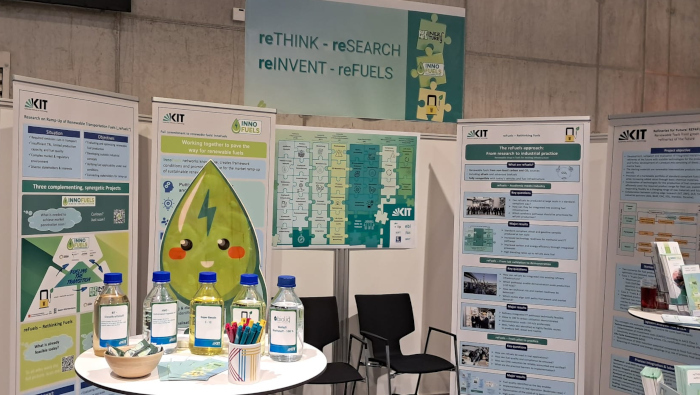
At Fuels of the Future 2026, experts from research and industry once again discussed the future of sustainable energy sources. The InnoFuels team also made several expert contributions, addressing topics related to the ramp-up of reFuels: from the transfer of research into practice, to cost and market ramp-up, to international partnerships and new production concepts. The presentations showed how important the interaction between research and industry is for the further development of renewable fuels. Fuels of the Future 2026 provided the perfect setting for this with exchanges, discussions, and networking.
Learn more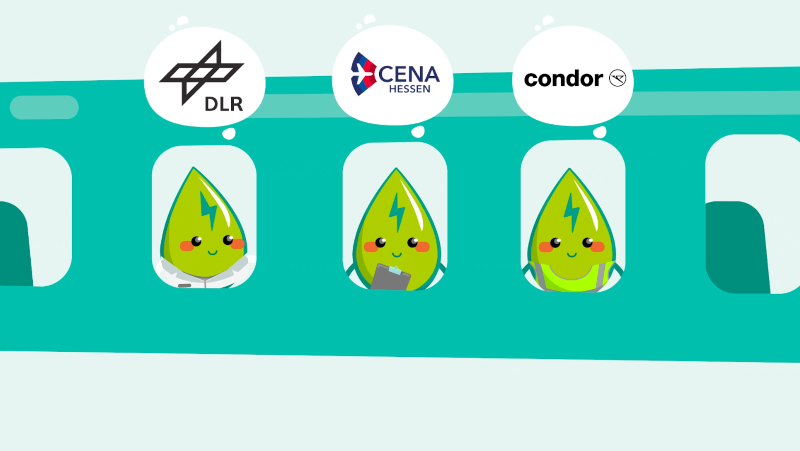
A new short film about InnoFuels is ready! It focuses on the innovation focus area of aviation and shows the challenges, goals and tasks that the team deals with on a daily basis. The film makes it clear how multifaceted the work in this focus area is: In addition to technological issues, the cooperation between different players along the value chain is also highlighted. In just two minutes, it becomes clear what contribution the aviation team makes to the overall goal of the InnoFuels project.
Learn more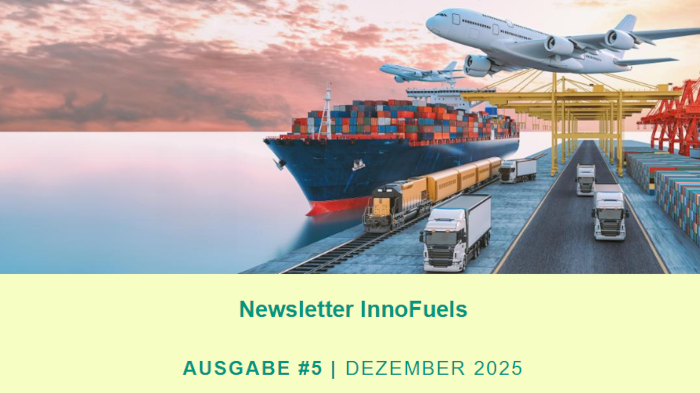
We are delighted to present the latest issue of our InnoFuels newsletter!In this issue, we look back on exciting developments of the last few months, including insights into past events and current projects - from practice-oriented workshops to international formats.
You will also find an outlook on upcoming events in 2026 and an overview of our latest publications. A special highlight is our short film, which vividly illustrates InnoFuels' work in the field of renewable aviation fuels.
Learn more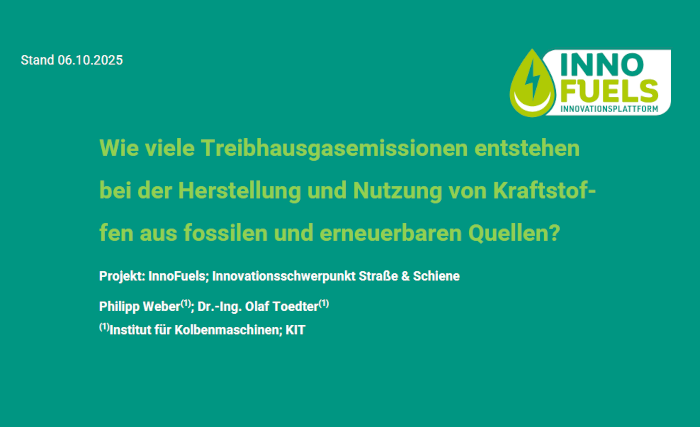
To what extent do the greenhouse gas emissions resulting from the production and use of fuels from fossil and renewable sources differ? A new compilation of literature from the InnoFuels project (innovation focus on road and rail) provides a compact overview of current findings and methodological approaches. The focus is on central terms and methods of GHG balancing, in particular the life cycle assessment methodology according to ISO 14040/44 and its application within the framework of the Renewable Energy Directive (RED). The overview is supplemented by exemplary emission values from our own calculations and the RED, which illustrate important influencing factors and sensitivities.
Learn more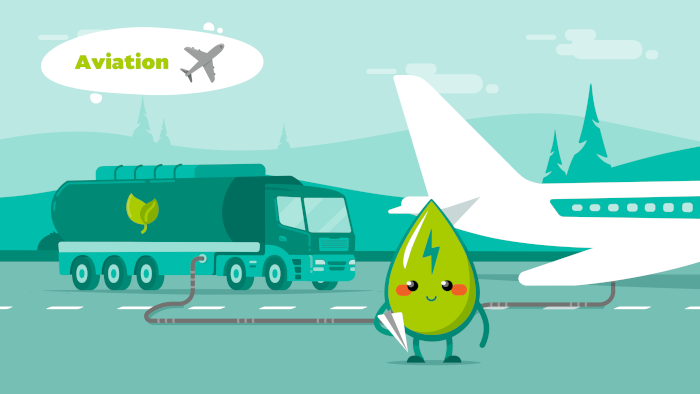
EU airlines are facing a double challenge: they need to significantly reduce their CO₂-emissions by 2050 - and at the same time remain internationally competitive. A new InnoFuels study shows how an aviation climate club can help. Three organizational models were examined - broker, management and invest model. The management model, which coordinates cooperation, steers the market for sustainable aviation fuels and compensates for competitive disadvantages, is favored. In short: together instead of alone - and a decisive step towards more climate-friendly aviation. The InnoFuels study thus provides an important impetus for the path to CO₂-neutral aviation by 2050.
Learn more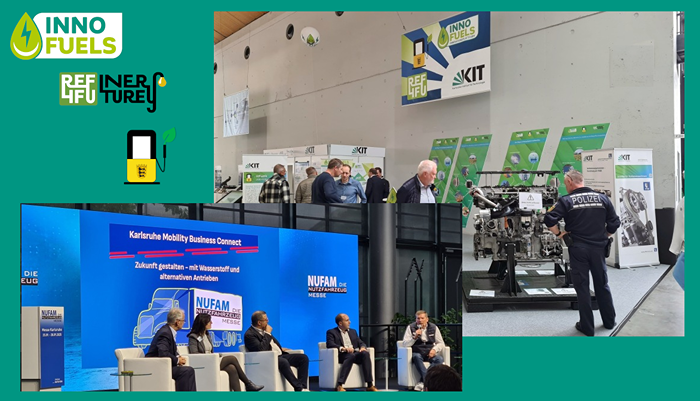
At NUFAM in Karlsruhe, everything at the Karlsruhe Institute of Technology (KIT) stand revolved around the future of sustainable fuels. With the InnoFuels, reFuels and REF4FU projects, visitors were able to discover how electricity-based and advanced biofuels are finding their way into practice - exciting for research, companies and politics alike. KIT was also present on stage: specialist presentations and a lively panel discussion focused on opportunities, challenges and concrete solutions for climate-friendly mobility. With these contributions, InnoFuels was able to successfully showcase its role as a platform for research, networking and transfer in the field of sustainable fuels at NUFAM.
Learn more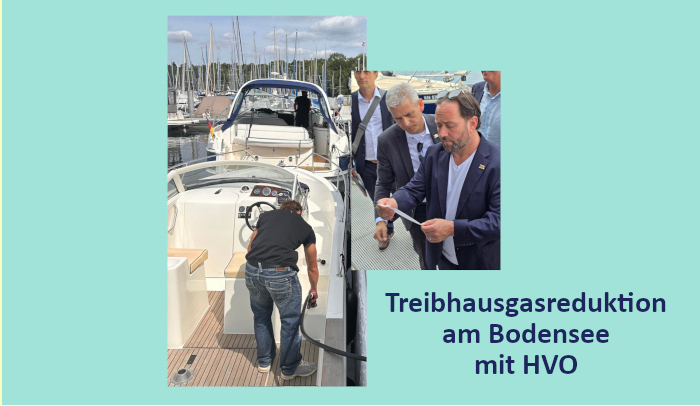
At the beginning of August, Baden-Württemberg State Secretaries Florian Haßler and Patrick Rapp visited the Ultramarin filling station in Kressbronn. As part of a state project, the regenerative fuel HVO (Hydrotreated Vegetable Oil) is being offered there for private ships - with a proven greenhouse gas reduction of 87%. This is made possible by the conversion of the marine filling stations to reFuels and the digital connection to fuel data, implemented in cooperation with Bosch. Even if InnoFuels is not directly involved here, such pilot projects are important signposts: they show how technology, politics and practice can work together to massively reduce CO₂ emissions.
Learn more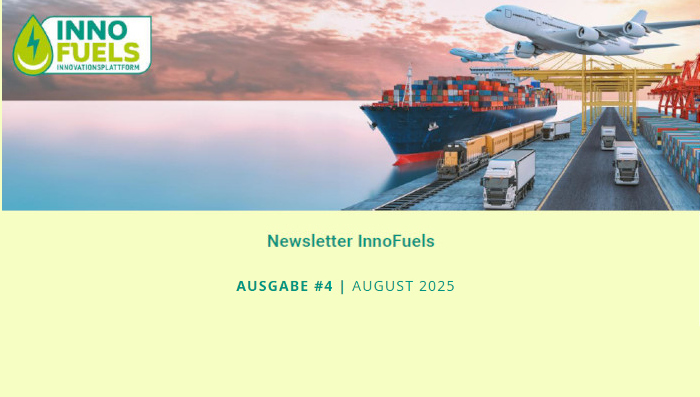
Under the motto "View from the future - impulses for today", we report on this year's InnoFuels Partner Day, which focused on an inspiring thought experiment: What could the world look like in 2030 if the ramp-up of renewable fuels is already a reality? As always, you can also expect insights into past events, ongoing activities, current publications and an outlook on what's to come.
Learn more
On June 26, 2025, the InnoFuels project partners came together at the RheinMain University of Applied Sciences in Rüsselsheim for this year's Partner Day. In addition to looking back on what has been achieved so far, the focus was on a creative workshop on vision, mission, values and strategy, as well as an intensive exchange on future focal points such as internationalization and regulatory levers. The event provided a wide range of stimuli and a clear signal for the joint further development of the project. Many thanks to all participants!
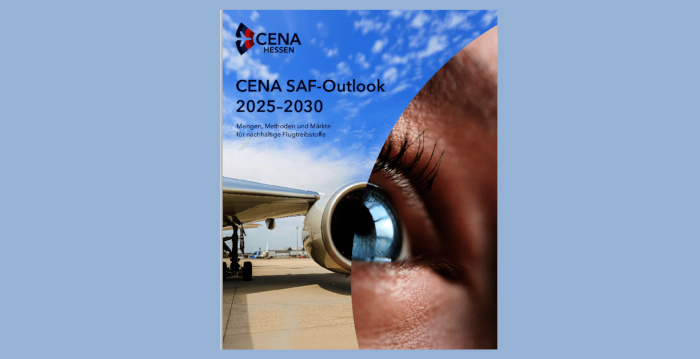
Our project partner CENA Hessen has published the updated version of the SAF Outlook 2025-2030. The analysis shows: Around 35 million tons of sustainable aviation fuels (SAF) could be produced worldwide by 2030 - with a clear focus on biogenic processes (HEFA) and production sites in North America, Europe and Asia. The European SAF quota is considered achievable, while uncertainties remain with regard to e-SAF. The report provides valuable insights for the further development of sustainable fuels - also within the framework of InnoFuels.
More information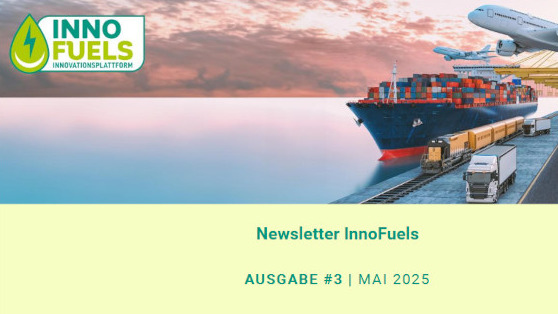
The editorial in the new InnoFuels newsletter puts it in a nutshell:
Technology alone is not enough for the successful ramp-up of reFuels. What is needed is the interaction of all players, coordinated processes and reliable framework conditions. In addition to reviews and outlooks on current events and new publications from the InnoFuels project, the newsletter shows why cooperation is crucial, what role internationalization plays - and how we can make further progress together.
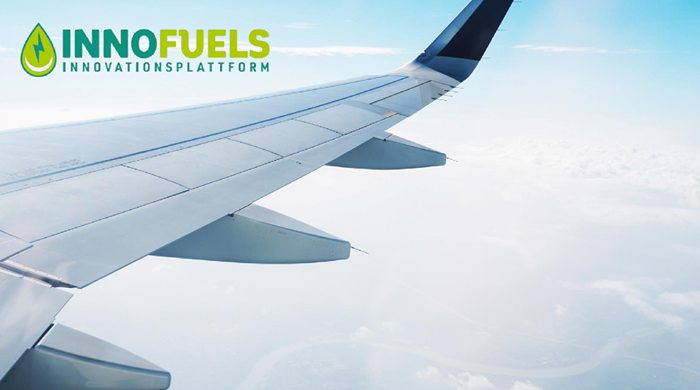
How can the use of sustainable aviation fuels (SAF) become a reality more quickly? The latest InnoFuels report from the aviation innovation focus provides around 50 pages of practice-oriented solutions that have been developed in collaboration with stakeholders from industry, research and politics. Readers are provided with sound insights into regulatory, economic and technological levers - including concrete recommendations for action to overcome existing market hurdles. A valuable basis for anyone who wants to actively shape the SAF transformation.
To Paper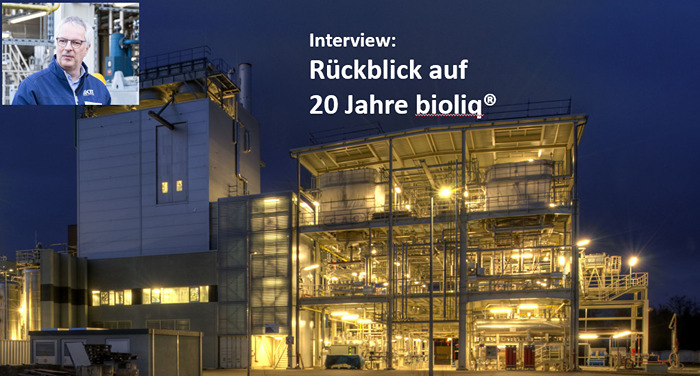
The bioliq® project at KIT demonstrated early on how residual biomass such as straw can be converted into synthetic fuel - a technological milestone that is also highly relevant for the InnoFuels platform project. The process chain comprises the shredding and drying of residual biomass, its thermochemical conversion via fast pyrolysis, the central gasification and purification of the synthesis gas and the subsequent chemical fuel synthesis. And all of this on an industrial scale. In this interview, project manager Prof. Nicolaus Dahmen looks back on the most important stages, challenges and successes of bioliq ®.
To interview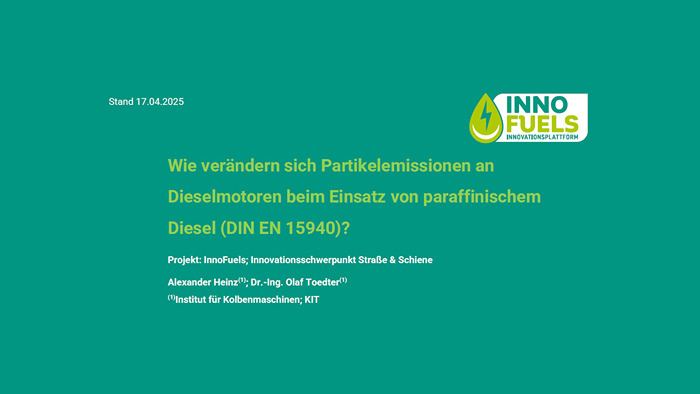
A new technical report from ISP Road&Rail summarizes how paraffinic diesel - especially HVO - affects the particle mass and particle number emissions of diesel engines. Both internal engine emissions and the effect of exhaust gas aftertreatment systems are taken into account. The paper provides important findings on engine and aftertreatment emissions and can thus support fleet operators, manufacturers and politicians in using the fuel, which has been officially approved since mid-2024, sensibly and responsibly as a climate-friendly option.
To paper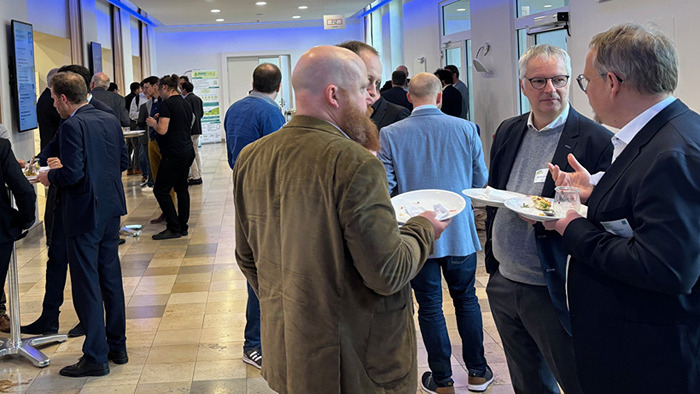
On April 2, the "Methanol-based fuels" symposium took place in Frankfurt am Main, organized by the "Production" team of the InnoFuels innovation platform. Experts from science and industry came together to discuss the current status of methanol-based fuels and the associated challenges. Key topics included the provision of renewable methanol and the processing of methanol into fuels, new business models for a successful market launch and research questions on further technological development.
More information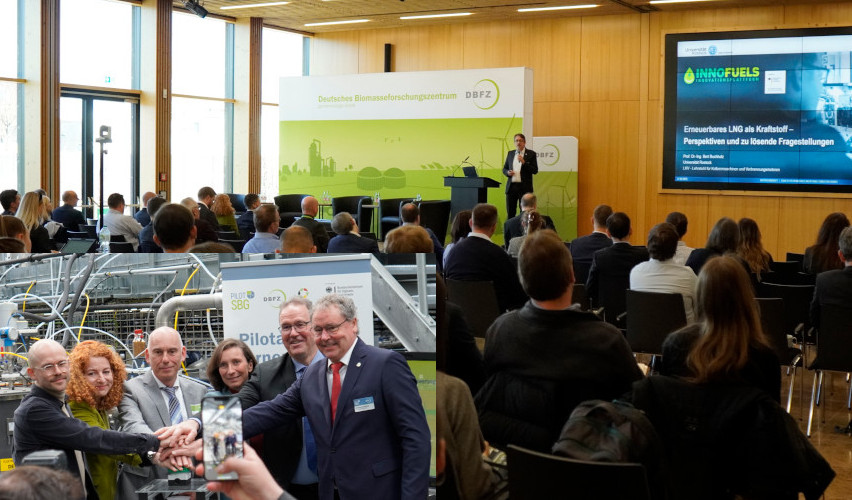
As part of the InnoFuels workshop at the DBFZ, experts discussed the potential and challenges of renewable LNG in the transport sector. In addition to practical experience and current research activities, the focus was on the strategic role of LNG for sustainable mobility. The workshop took place on the occasion of the official commissioning of the new pilot plant for synthesized biogas (SBG), which will research innovative technologies for the production and use of renewable methane in the future. Further information, the agenda and presentation slides can be found under the link below.
To the agenda and presentation slides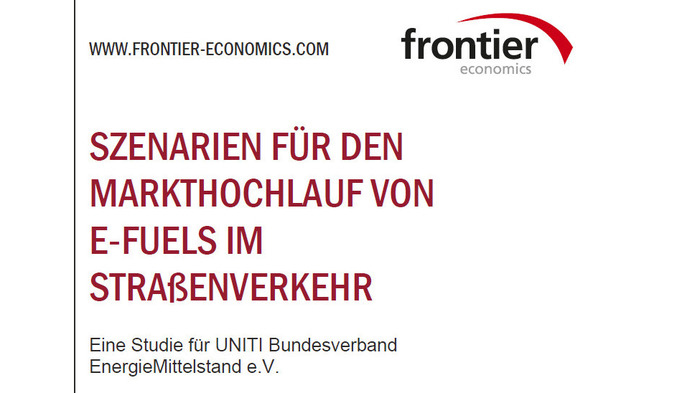
At a workshop in mid-February, the focus this time was on scenarios for the market ramp-up of e-fuels in road transportation. Our project partner, Frontier Economics, had analyzed and evaluated studies from several institutes in detail on behalf of an association. The results provide valuable insights into the expected price development of a fuel mix of fossil and green gasoline and diesel in the coming decades - a crucial basis for planning the market ramp-up. The subsequent discussion based on the diverse experiences of the InnoFuels partners once again provided new impetus.
To study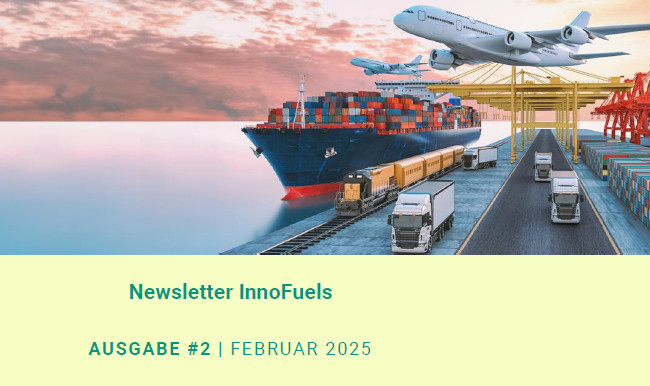
The latest issue of our newsletter is now available! Find out more about the latest developments in the InnoFuels project, the latest debates on the ramp-up of renewable fuels and exciting reviews of past workshops.
You can view or download the current issue directly here. Stay informed and register for free on our newsletter page!
To Newsletter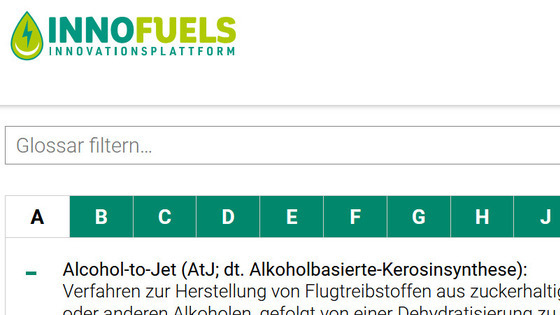
You can now find a comprehensive glossary with around 100 technical terms from the world of renewable fuels and energy technologies on InnoFuels.de. Whether alcohol-based kerosene synthesis, Fischer-Tropsch synthesis, liquefied natural gas, naphtha or water electrolysis - our directory offers you precise explanations of key topics and terms.
Best of all, the glossary is constantly being expanded so that you are always up to date. Take a look and be inspired!
To Glossar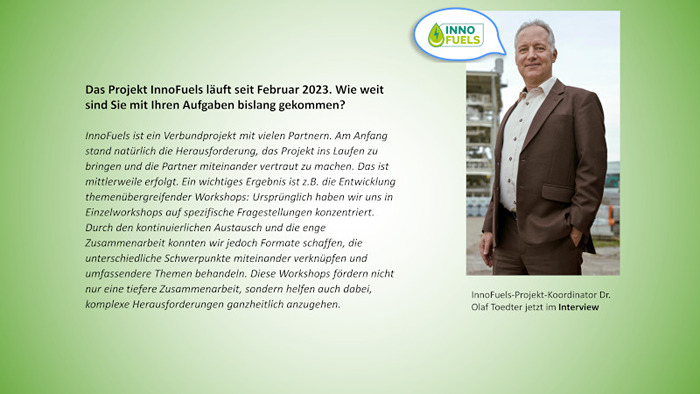
New workshops, exciting studies, and international networking—InnoFuels is starting 2025 full of energy! How can renewable fuels be successfully ramped up? What are the next steps? An interview with project coordinator Dr. Olaf Toedter provides exciting insights into the vision and the next milestones.
Learn more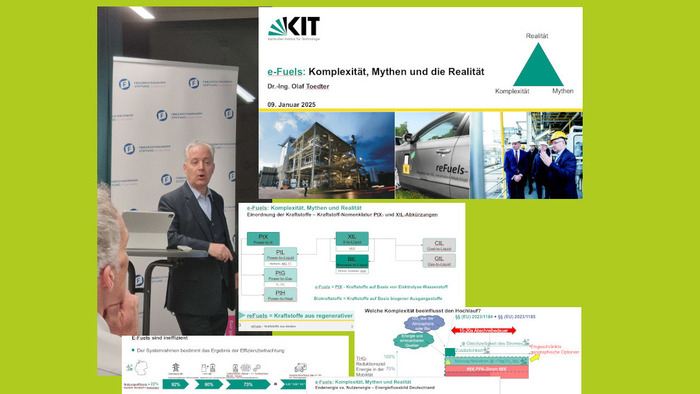
At a recent event organized by the Friedrich Naumann Foundation in Karlsruhe, the focus was on a highly topical issue: eFuels and their role in the energy transition. InnoFuels project manager Olaf Toedter gave a keynote speech aimed at explaining the complexity of the topic, dispelling common myths and providing a clear and well-founded presentation of the reality surrounding eFuels. The entire spectrum of topics was covered: from the terminology of fuels, technical dependencies and regulatory framework conditions for the market ramp-up to the current development of the reFuels ramp-up.
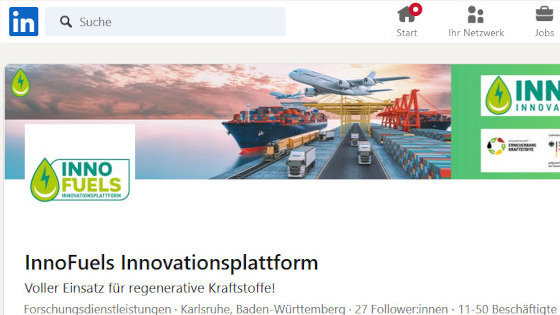
The InnoFuels platform project now has its own LinkedIn page! There you will find exciting news, project highlights and the opportunity to exchange ideas and network with the renewable fuels community. Our goal is to engage in many lively discussions, share knowledge and learn from each other. We warmly invite you to follow our page and share it with your network to further increase the reach of InnoFuels. We look forward to your support!
Go to LinkedIn page
Discover our new section! In ‘Knowledge at a Glance’, you will find compact, well-founded information on current developments and conditions in the transport sector. Stay informed and use the clear summaries to quickly get up to speed on important topics. The first focus is on the legal requirements for the ramp-up of reFuels.
View now
At the Rostock Large Engines Conference (RGMT) on 12 and 13 September, Dr.-Ing. Karten Schleef will describe the challenges facing the shipping industry and how the ramp-up of renewable fuels could advance the industry. The Chair for Piston Engines and Combustion Engines at the University of Rostock is co-organising the RGMT, which sees itself as an international forum for professional dialogue between legislators, researchers, developers and operators of large engines. This year, the InnoFuels project will also be represented with a stand.
To interview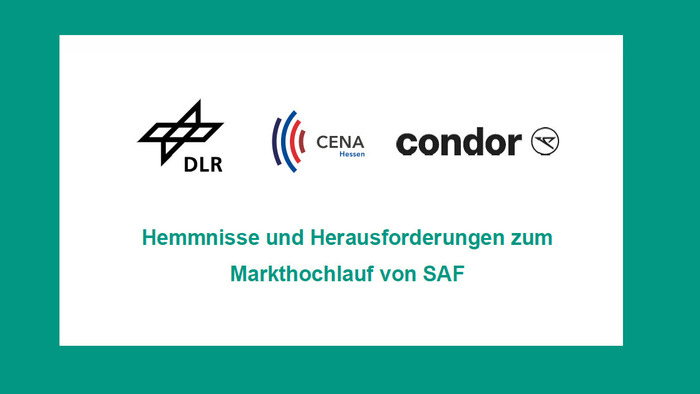
A new publication from the Aviation Innovation Centre analyses the obstacles and challenges currently hindering the market ramp-up of SAF in Germany. The obstacles were identified in two stakeholder workshops in September 2023 and February 2024 and supplemented by literature research and expert interviews.
About the publication
On 28 August, the German Biomass Research Centre (DBFZ) hosted an InnoFuels workshop entitled ‘Market assessment of SAF – Are we aware of all the possibilities of Book&Claim?’ Niels Dögnitz, a member of the organising team, talked about the background and objectives of the workshop in the run-up to the event.
To interview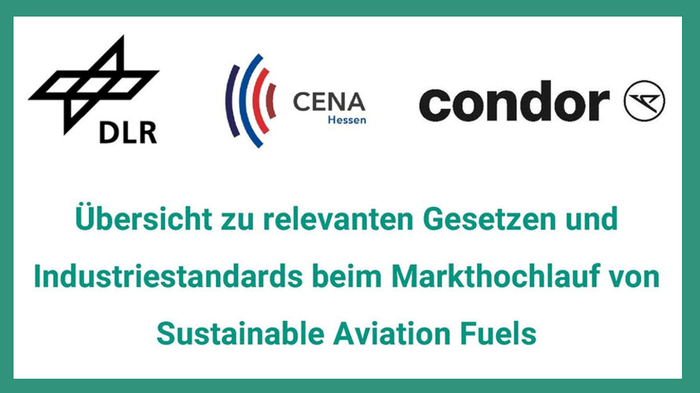
This review examines the regulations, laws and industry standards that define the framework conditions for the market ramp-up of SAF. International, EU-wide and national regulations and plans are analyzed and the responsible institutions are presented and classified. The publication was produced by the Aviation Application Field, which includes the German Aerospace Center, CENA Hessen and the airline Condor.
About the publication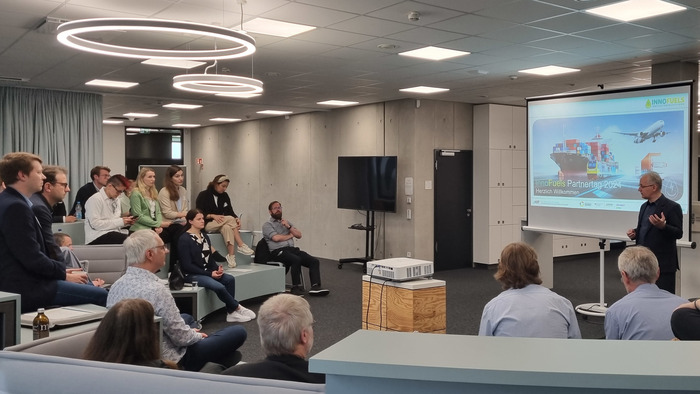
Einen Tag nach dem ISP-Luftverkehrs-Workshop fand am 20.06. in Karlsruhe der InnoFuels-Partnertag statt. Dabei wurde deutlich, dass der intensive Austausch zwischen den verschiedenen Innovationsschwerpunkten entscheidend für den Erfolg des Projekts ist. Zudem zeigt sich immer klarer, dass die Beseitigung marktwirtschaftlicher Defizite als Schlüssel zur Beschleunigung des Hochlaufs angesehen wird.
Link_more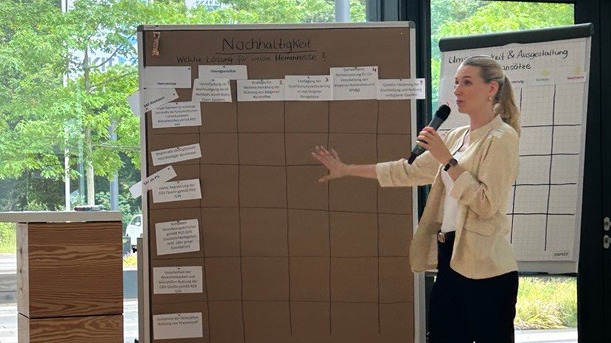
Spannende Diskussionen, unterschiedlichste Sichtweisen und ein Ziel: Wir wollen nachhaltige Flugtreibstoffe attraktiver machen. Beim InnoFuels-Workshop zum Thema „Lösungsansätze für den Markthochlauf von Sustainable Aviation Fuels“ kam das geballte Wissen von Expertinnen und Experten aus allen relevanten Bereichen zusammen. Es wurden Lösungen und Maßnahmen speziell mit Blick auf Produktion, potenzielle Investoren, Regulatorik, Nachhaltigkeit und die Luftfahrt-Anwender diskutiert.
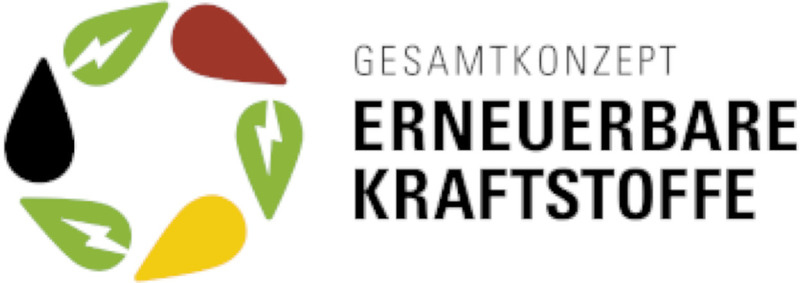
Im Rahmen des Gesamtkonzepts Erneuerbare Kraftstoffe der Bundesregierung sind ab sofort zwei sehr nützliche digitale Tools verfügbar: Zum einen ein Programmmonitor, der die wichtigsten Kennzahlen des Förderprogramms zur Entwicklung erneuerbarer Kraftstoffe darstellt. Zum anderen ein weiterer interaktiver Monitor, der alle global angekündigten Sustainable Aviation Fuels-Projekte (Stand: Mai 2024) darstellt. Beide Monitore bieten sowohl eine umfassende Karte über die globale Verteilung der Projekte als auch Informationen zu allen wichtigen Details.
Zu den beiden NOW-Tools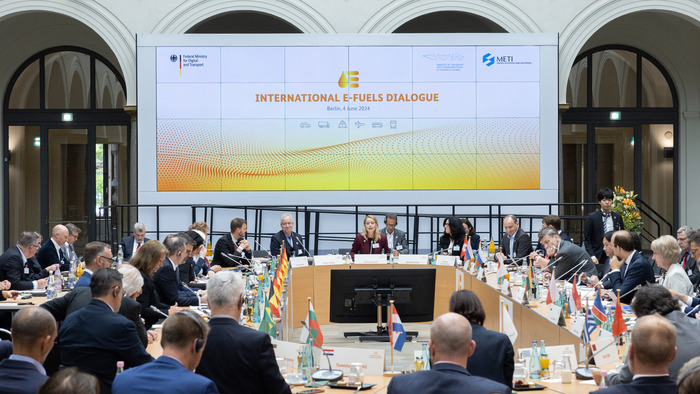
Beim internationalen E-Fuels Dialog waren Vertreter aus Wissenschaft, Wirtschaft und Politik zusammen gekommen, um über die notwendigen Bedingungen für Skalierung und Investitionssicherheit zu beraten. Ausgerichtet wurde die Konferenz in diesem Jahr von Deutschland, Litauen und Japan. Die drei Länder hatten zuvor die sogenannte Berliner Erklärung zum Hochlauf der E-Fuels unterzeichnet. Beim anschließenden internationalen Dialog war auch InnoFuels-Projektleiter Dr. Olaf Toedter dabei.
Link_more
Der CENA SAF-Outlook 2024-2030 liefert erstmals eine Bestandsaufnahme der aktuellen und prognostizierten SAF-Produktionsmengen bis 2030. Er zeigt, welche Verfahren bei der SAF-Produktion wann zum Einsatz kommen und wie der Entwicklungsstand (Härtegrad) der jeweiligen Vorhaben einzuschätzen ist. Dies geschieht vor dem Hintergrund der Prüfung, ob mit den angekündigten Produktionskapazitäten die Quoten auf nationaler und EU-Ebene erfüllt werden können. Hierfür wurden öffentlich einsehbare Quellen ausgewertet und mit eigens erhobenen Unternehmensdaten abgeglichen.
Zur CENA-Analyse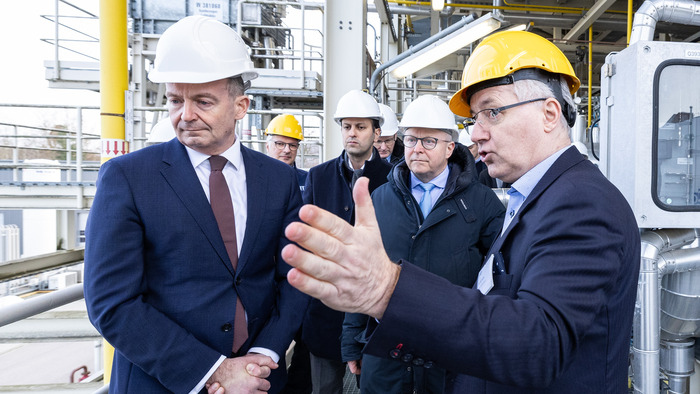
Beim Besuch Wissings am 1. März 2024 auf dem Campus Nord des KIT ging es um aktuelle Projekte in der Mobilitäts- und Energieforschung. Der Minister besichtigte dabei auch das Energy Lab 2.0 und die Bioliq-Anlage. In beiden Pilotanlagen werden reFuels hergestellt.
„Power-to-Liquid-Verfahren sind ein wichtiger Baustein für die Mobilität der Zukunft. Sie werden dazu beitragen, unsere Klimaschutzziele zu erreichen. Um diese nachhaltige Transformation in den Bereichen Mobilität und Energie voranzubringen, brauchen wir Forschung, wie sie am KIT stattfindet“, sagte Wissing während des Besuchs.
Zur Presseinformation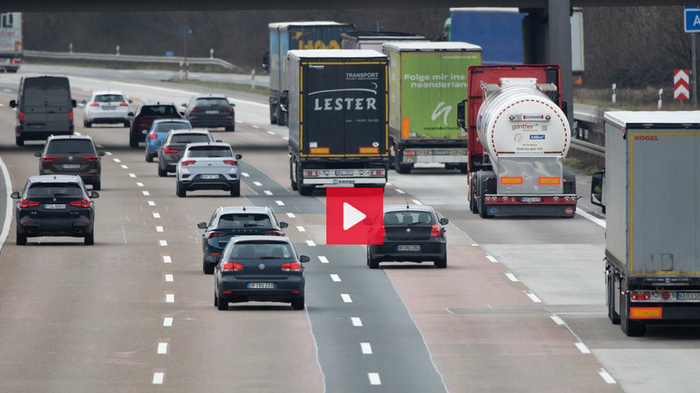
Am 22. Februar beschäftigte sich das bekannte Wissenschaftsmagazin NANO mit den Klimazielen im Verkehrssektor und welche Rolle erneuerbare Kraftstoffe dabei spielen. Dabei wurden verschiedene Herstellungspfade der reFuels vorgestellt. Im Beitrag kommt auch reFuels-Projektleiter Olaf Toedter zu Wort. Thematisiert wird insbesondere, warum die eFuels trotz ausgereifter Technik immer noch nicht großflächig zur Verfügung stehen.
Zur Nano-Sendung
Das Potential von reFuels zur CO2-Reduktion im Verkehrssektor wird häufig unterschätzt. Dabei werden jedoch wichtige Aspekte außer Acht gelassen. Welche Chancen tatsächlich in reFuels stecken, und was an Infrastruktur, Regulatorik und gutem Willen notwendig wäre, damit Klima und Wirtschaft gleichermaßen profitieren, erklärt reFuels-Projektleiteiter Olaf Toedter im Interview mit dem Technikmagazin krafthand.
Zum Online-Artikel%20KIT_Markus%20Breig%20und%20Amadeus%20Bramsie-3.jpg)